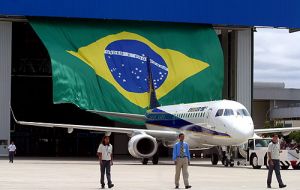MercoPress. South Atlantic News Agency
Brazil’s “competitiveness cliff” and commodities dependency exposed in World Bank report
 In ten years the proportion of commodities increased from 46% to 63% of total exports
In ten years the proportion of commodities increased from 46% to 63% of total exports  Technology exports (as Embraer aircraft) in the same period dropped from 10.4% to 5% of total overseas sales
Technology exports (as Embraer aircraft) in the same period dropped from 10.4% to 5% of total overseas sales Brazil is not only the biggest country in Latinamerica but also has the largest economy and expects to play a leading role in the global economy in the near future, however a report from the World Bank is not so enthusiastic and points out to a series of challenges the country must address if it wishes to effectively become a super star.
Argentine born columnist Andres Oppenheimer who writes regularly for the Miami Herald in his latest piece describes Brazil as “the self-absorbed giant” and despite recent rosy statements from President Dilma Rousseff announcing a record crop of grains and oilseeds this season; the discovery of even more oil and gas deposits and the fact Brazil will be hosting the World Cup in 2014 and the Olympics in 2016, which should give the country that big boost, he prefers to appeal to the data supplied by the World Bank’s “Brazil’s competitiveness cliff” report.
In effect the report shows, and supported by stats, that industrial exports are not advancing, probably the contrary and Brazil faces “considerable competitiveness challenges”. In other words Brazil is lagging behind other emerging economies such as China, India, Russia and South Africa, all of them associates of BRICS.
The report from economists Otaviano Canuto, Matheus Cavallari and José Guilherme Reis says that total exports from Brazil have doubled in recent years, mostly because of the booming prices of commodities. And nevertheless they are far below those from the other emerging economies. While in the last decade Brazilian exports increased by 262%, the average for the other emerging economies (China, India, Russia and South Africa) has been 439%.
Brazil’s trade integration with other countries “is among the lowest in the world and there is no sign of progress in that field”, points out the report. Even when Brazil leads in Latinamerica in high technology exports (for example Brazilian aircraft from Embraer are very successful and in great world demand), “there is a clear contraction in the high technology exports in recent years”.
“Brazil high technology exports have dropped from 10.4% of total sales in 2000 to less than 5% in 2010. Inversely the proportion of commodities increased from 46% to 63% of total exports in that period”. In other words Brazil has become increasingly dependent of food exports, and also highly dependent on China.
During the last decade high technology exports from Brazil expanded a modest 36% while those of China and India jumped 873% and 389% respectively. Among the reasons for the mediocre performance of Brazil are an overvalued currency which increased labour costs, low productivity, high logistic costs and the painfully slow government bureaucracy.
“The Brazilian government is well aware of these problems” said Canuto one of the economists who wrote the report, “but it must implement quickly its plans because the growth factors which worked well for the country in recent years are exhausted. World prices for commodities will not continue to advance as in the last ten years”.
Other economists are a bit more optimistic emphasizing that the Brazilian economy will most probably recover and expand 3.5% this year, and the current administration of President Rousseff is planning more infrastructure transfers to the private sector. Besides Brazil is adopting drastic measures to combat corruption and improve education standards. Rousseff recently launched a program to have 100.000 Brazilian graduates to pursue mostly science and technology degrees in US and European universities.
But Brazil must move faster and integrate to the world economy if it wishes to expand particularly when the world seems to be moving towards mega free trade spaces as the recently announced by the US and the European Union. Likewise Brazil must have some degree of trade integration with the US or the EU or any other major trade block and needs to stop relying entirely on its domestic market and increasing prices of commodities, are some of the conclusions of the report.




Top Comments
Disclaimer & comment rules-

-

Read all commentsI am afraid to say that this report highlights the lack of financial acumen at the highest levels in the government of Brasil.
Mar 05th, 2013 - 06:15 pm 0Dilma should consider the role Mantega has played in this travesty and replace him immediately with someone who understands what the role of a Minister of Finance is.
This man does not understand that only stable conditions and transparency in government figures will encourage international investors. Downright lies about growth rates do the opposite. I seriously doubt whether Mantega has ever heard the term ‘depleted cash flow analysis’ as it relates to investments.
Dilma CANNOT do it all herself and perhaps this apparent reluctance to take action in the finance department underlines her own weakness in understanding financial management.
Contrast that with the excellent choice of the head of Petrobras that she announced last year. If you can do it there Madame President, you can surely do it with the Minister of Finance. Whatever choice you make cannot be worse than Mantega.
The key to becoming an integral part of the world economy is for Brasil to win EU or US trade integration.
Mar 05th, 2013 - 08:39 pm 0Argentina has focussed its energies on holding back Brasil and blocking any progress that Brasil could make through Mercosur.
Brasil must 'play the world', not pander to the crazies running the 'Bolivarian' countries in South America.
Dilma, create the vision and MAKE THINGS HAPPEN!
Commenting for this story is now closed.
If you have a Facebook account, become a fan and comment on our Facebook Page!